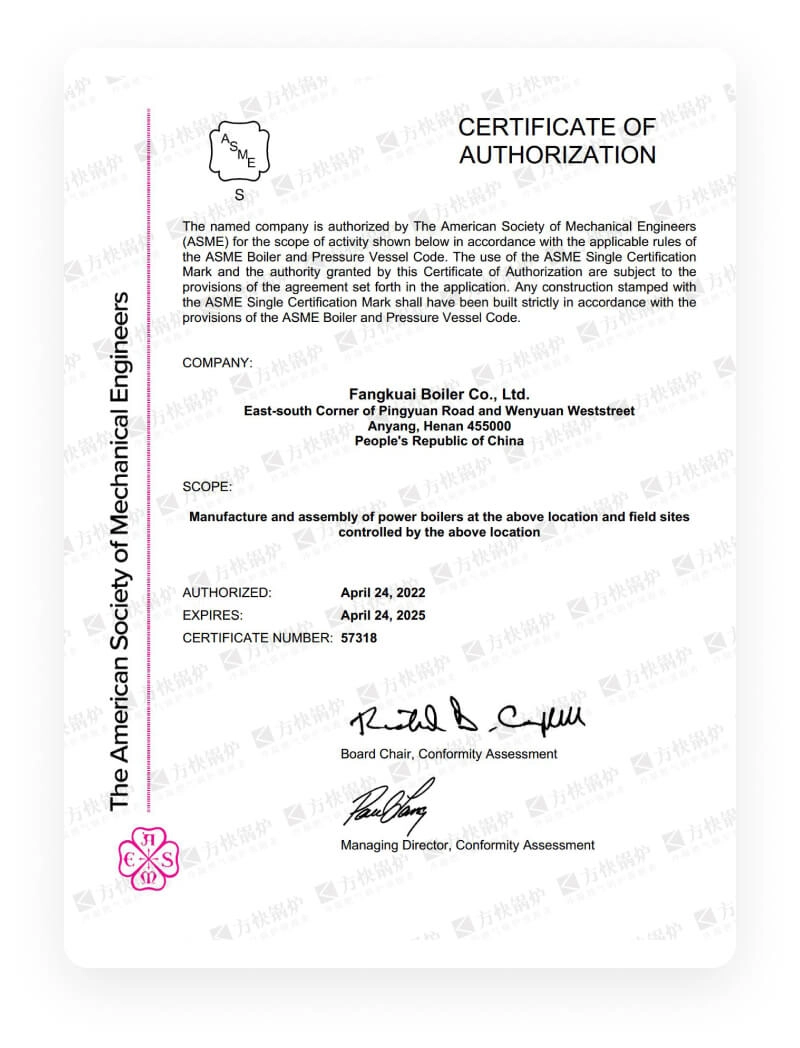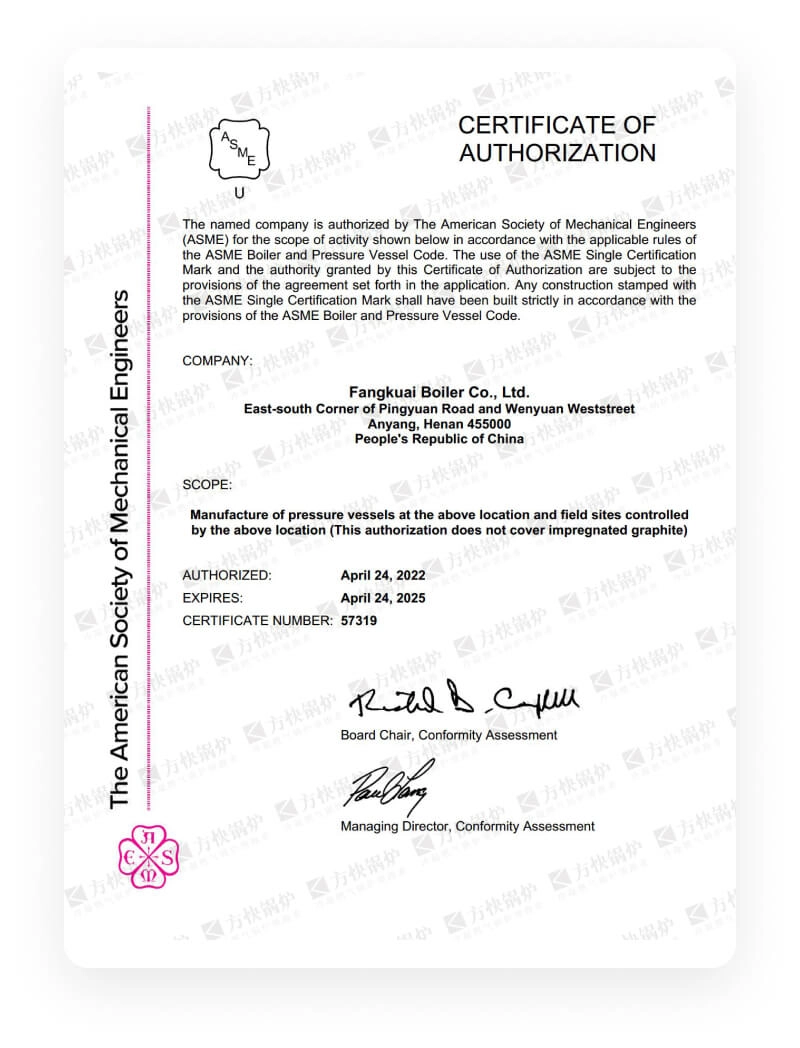Can Fuel Steam Boilers Be Converted to Gas Boilers?
date: 2024-08-19
Page preview:
Introduction
Have you ever wondered if your fuel-fired steam boiler can be converted to a gas boiler? This common project can bring a range of benefits, but it requires careful consideration and expertise to ensure a safe and efficient outcome. In this blog post, we will explore the feasibility, cost implications, and environmental advantages of converting your boiler. Whether you're looking to reduce emissions, cut costs, or simply update your system, this conversion could be the solution you've been seeking. Let's delve into the details and discover if this transformation is the right choice for you.
Feasibility of Conversion
Assessing the Viability
You may be wondering if it's possible to convert your fuel-fired steam boiler to a gas boiler. Well, the good news is that it is indeed feasible. By evaluating the availability of natural gas in your area, selecting the right gas boiler, and enlisting the help of professionals, you can successfully make the switch. This transformation requires careful planning and expertise to ensure a smooth and effective conversion process.
Green Engineering Practice
Converting your boiler from oil to natural gas is not just a technical change; it's a step towards green engineering. Natural gas emits fewer harmful emissions compared to oil, making it a more environmentally friendly option. The reduction in emissions can contribute to a healthier environment with improved air quality. Additionally, with the cost of oil and oil-fueled systems remaining high, converting to natural gas can also be a cost-effective choice in the long run.
Cost and Efficiency Considerations
While the feasibility of conversion is evident, it's important to consider the cost implications. The conversion process typically ranges between $5,000 and $10,000, covering expenses like selecting a new gas boiler and hiring professionals for the installation. However, the long-term cost savings and efficiency gains from using natural gas can offset the initial investment. By weighing the upfront costs against the potential benefits, you can make an informed decision about the feasibility of converting your boiler.
Professional Expertise Required
Converting your boiler to a gas system is not a DIY project. It requires professional expertise to ensure the safety and efficiency of the conversion. Hiring experienced professionals who understand the intricacies of the process can help you avoid potential pitfalls and ensure a successful outcome. With the right team by your side, you can navigate the conversion process with confidence and peace of mind.
Cost Considerations
When considering the cost implications of converting your fuel-fired steam boiler to a gas boiler, it's essential to weigh the financial investment against the long-term benefits. Here are some key points to keep in mind:
-
The cost of the conversion typically ranges between $5,000 and $10,000, depending on various factors such as the size of the boiler and the complexity of the conversion process.
-
This cost includes expenses associated with selecting a new gas boiler, hiring professionals for the conversion, and potentially removing the old oil tank.
-
While the initial investment may seem significant, the switch to a gas boiler can lead to cost savings in the long run due to the lower cost of natural gas compared to oil, as well as potential energy efficiency improvements.
Making the decision to convert your boiler involves careful consideration of the upfront costs and the potential savings over time. By understanding the financial implications and weighing them against the environmental benefits and operational efficiency, you can make an informed choice that aligns with your goals and priorities. Stay tuned for more insights on the conversion process and other key considerations in the upcoming sections of this blog post.
Environmental Benefits
When considering the conversion of your fuel-fired steam boiler to a gas boiler, one of the key aspects to ponder is the environmental benefits that come with this transition. Here are some advantages that you may reap from making this change:
-
Reduced Emissions: Gas boilers emit significantly fewer emissions compared to oil-fired systems. This reduction in emissions can play a crucial role in reducing air pollution and improving overall air quality in your surroundings.
-
Sustainability: Opting for a gas boiler aligns with sustainable practices, as natural gas is a cleaner and more environmentally friendly fuel source. By switching to gas, you contribute to a greener environment and support sustainability efforts in your community.
-
Improved Air Quality: With lower emissions and a cleaner burning process, gas boilers can lead to improved air quality. This benefit extends beyond your immediate surroundings and can positively impact the overall environmental health of your area.
-
Carbon Footprint Reduction: By converting to a gas boiler, you can actively reduce your carbon footprint. This reduction in greenhouse gas emissions helps combat climate change and promotes a more environmentally conscious approach to heating your space.
Considering these environmental benefits, transitioning from a fuel-fired steam boiler to a gas boiler not only enhances the efficiency of your heating system but also contributes to a healthier and more sustainable environment. Embracing this change can make a positive impact on both your home and the planet as a whole.
Conversion Process
When it comes to converting your fuel-fired steam boiler to a gas boiler, the conversion process involves several critical steps to ensure a successful outcome. One key aspect is modifying the combustion system, which includes changing the igniter to accommodate gas burning characteristics and installing a suitable gas burner that matches the furnace type for optimal flame coverage and combustion efficiency.
Another essential component of the conversion process is adapting the fuel supply system. This entails adding a front-end natural gas system, including gas operation platforms, main gas pipelines, wall-mounted gas pipelines, and gas exhaust systems, to guarantee a stable gas supply and safe exhaust. Additionally, incorporating a natural gas pressure reduction station with essential equipment like water-bath heaters, filters, and main pressure regulators is crucial to adjusting gas pressure and temperature to meet the boiler's combustion requirements.
The control system plays a vital role in the conversion process as well. Designing a new control system that integrates existing controls is necessary to enable functions such as automatic water level regulation, high and low water level alarms, high furnace outlet temperature alarms, and overpressure steam pressure alarms. Moreover, adding safety protection devices like gas high and low pressure alarms, gas system leak alarms, and post-burner blowdown enhances the overall safety of the boiler operation. Ensuring the control system is robust and efficient is paramount for a successful conversion.
Lastly, the physical modifications to the boiler itself are essential in the conversion process. Removing unnecessary components specific to coal-fired boilers, sealing the furnace walls and doors to prevent gas leaks, and adding a ignition air system to improve boiler ignition success and stability are crucial steps in ensuring the boiler operates safely and efficiently as a gas-fired system. These modifications are key to the successful transformation of your boiler from fuel-fired to gas-fired.
Considerations for Safety
Prioritizing Safety in the Conversion Process
Safety should be the top priority when converting your fuel-fired steam boiler to a gas boiler. It is crucial to adhere strictly to safety regulations throughout the entire conversion process. This will ensure the well-being of the construction crew and the stable operation of the boiler once the conversion is complete. By prioritizing safety, you can minimize the risk of accidents and ensure a smooth transition to a gas system.
Implementing Comprehensive Safety Measures
To enhance safety during the conversion, it is vital to implement comprehensive safety measures. This includes conducting thorough risk assessments, providing appropriate safety training for the construction crew, and ensuring that all safety equipment is in place and functioning effectively. By taking proactive steps to address safety concerns, you can minimize potential hazards and create a secure working environment for everyone involved in the conversion process.
Ensuring Compliance with Safety Standards
Compliance with safety standards is non-negotiable when converting your boiler to a gas system. Make sure that all aspects of the conversion process meet the required safety regulations and guidelines. This includes proper installation of safety devices, adherence to industry best practices, and regular inspections to verify compliance. By ensuring that safety standards are met, you can prevent accidents, protect your investment, and maintain the integrity of your new gas boiler system.
Partnering with Experienced Professionals
Working with experienced professionals is essential for ensuring safety during the conversion process. Hire reputable contractors who have the expertise and knowledge to handle the intricacies of converting a boiler to a gas system. Experienced professionals will prioritize safety, follow proper procedures, and address any safety concerns that may arise during the conversion. By partnering with experts, you can rest assured that your conversion project is in safe hands.
Conducting Regular Safety Audits
Even after the conversion is complete, it is essential to conduct regular safety audits to ensure ongoing safety and compliance. Regular audits will help identify any potential safety issues, address them promptly, and prevent accidents or malfunctions. By staying vigilant and proactive in monitoring safety, you can maintain a safe working environment and ensure the continued safe operation of your newly converted gas boiler system.
Considerations for Efficiency
When considering the efficiency of converting your fuel-fired steam boiler to a gas boiler, there are several key factors to keep in mind. Efficiency is crucial to ensure that your new system operates optimally and delivers the desired results. Here are some important points to consider:
-
Burner Selection: Choosing the right gas burner for your boiler is essential for efficiency. The burner should be compatible with the boiler's design and ensure efficient combustion to maximize energy output.
-
Fuel Supply System: A reliable and well-designed fuel supply system is vital for efficient operation. Ensure that the gas supply is stable, and the pressure and flow rate are adequate for optimal performance.
-
Control System Optimization: Upgrading the control system to include features like automatic water level regulation and temperature monitoring can enhance efficiency. A well-designed control system can adjust settings in real-time to optimize performance.
-
Sealing and Insulation: Properly sealing the boiler walls and doors is essential for maintaining efficiency. This prevents heat loss and ensures that the system operates at the desired temperature levels.
Efficiency plays a significant role in the overall performance of your boiler system. By considering these factors and implementing measures to enhance efficiency, you can maximize the benefits of converting to a gas boiler. Ensuring that your system operates efficiently not only saves energy but also prolongs the lifespan of the equipment and reduces maintenance costs in the long run.
Considerations for Compliance
When undertaking the conversion of your fuel-fired steam boiler to a gas boiler, it is crucial to prioritize compliance with safety and environmental regulations. Ensuring that your new system meets all necessary standards and guidelines will not only protect your investment but also safeguard the well-being of your surroundings. By adhering to regulatory requirements, you can avoid potential fines, penalties, or operational disruptions that may arise from non-compliance.
Compliance considerations extend beyond just the initial conversion process. It is essential to regularly monitor and maintain your gas boiler to ensure ongoing compliance with safety and environmental regulations. Conducting routine inspections, testing for leaks, and promptly addressing any issues that arise will help you stay on the right side of the law while promoting the longevity and efficiency of your boiler system.
In addition to governmental regulations, it is also important to consider industry standards and best practices when converting your boiler. By following established guidelines and recommendations, you can enhance the safety, reliability, and performance of your gas boiler. Staying up to date with industry advancements and incorporating them into your conversion project will help you achieve optimal results and peace of mind.
Seeking professional guidance and expertise throughout the conversion process can greatly assist in ensuring compliance with all relevant standards. Consulting with experienced engineers, technicians, and regulatory experts will enable you to navigate any complexities or uncertainties that may arise during the conversion. Their knowledge and insights can help you make informed decisions and avoid potential pitfalls that could compromise compliance.
By prioritizing compliance throughout the conversion of your fuel-fired steam boiler to a gas boiler, you are not only investing in the safety and efficiency of your system but also contributing to a cleaner and healthier environment. Embracing compliance as a guiding principle in your project will set the foundation for a successful and sustainable transition to a more environmentally friendly and cost-effective heating solution.
Key Steps in the Conversion Process
When embarking on the conversion of your fuel-fired steam boiler to a gas boiler, several key steps must be taken to ensure a successful transformation. The first crucial step involves modifying the combustion system. This includes replacing the extinguisher with a dual-use oil and gas extinguisher, which may require adjustments to accommodate the unique combustion characteristics of gas. Additionally, selecting and installing a suitable gas burner is essential to match the furnace type, ensuring optimal flame coverage and combustion efficiency.
Next, attention must be given to the fuel supply system. Adding a natural gas system in front of the boiler is necessary to guarantee a stable gas supply and safe venting. This includes components such as a gas operating platform, main natural gas pipelines, front and back wall gas pipelines, and a gas venting system. Moreover, incorporating a gas pressure reducing station with equipment like water bath heaters, filters, and main pressure regulating valves is crucial to adjust gas pressure and temperature within the required range for boiler combustion.
The control system plays a vital role in the conversion process. Designing a new control system that integrates with the existing one is essential for functions such as automatic water level regulation, high and low water level alarms, high temperature alarms at the furnace outlet, and overpressure steam alarms. Additionally, implementing safety protection devices, such as high and low gas pressure alarms, gas system leak alarms, and post-combustion purge after boiler shutdown, enhances the operational safety of the boiler.
Lastly, modifications to the boiler body are necessary for a seamless conversion. Removing unnecessary components specific to coal-fired boilers, like coal hoppers, grates, and dust collectors, is a fundamental step. Sealing the furnace walls and doors is essential as gas boilers operate under a slight positive pressure, requiring all furnace walls and doors to be airtight to prevent gas leakage. These key steps in the conversion process are crucial to ensure the safe, efficient, and compliant operation of your newly transformed gas boiler.
Conclusion
In conclusion, converting a fuel-fired steam boiler to a gas boiler is a feasible project that can bring a range of benefits. While it requires careful consideration and expertise, the potential environmental advantages, cost savings, and efficiency improvements make it a worthwhile endeavor for many. By understanding the conversion process, safety considerations, and compliance requirements, you can ensure a successful outcome. Whether you're looking to reduce emissions, update your system, or simply cut costs, this transformation could be the solution you've been seeking. Consider the key steps outlined in this blog post and make an informed decision on whether converting your boiler is the right choice for you.

















